stephen king's
'crossings' and 'boundaries'
by
antolin gibson
[ + link to: The Jaunt - podcast ]
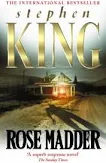
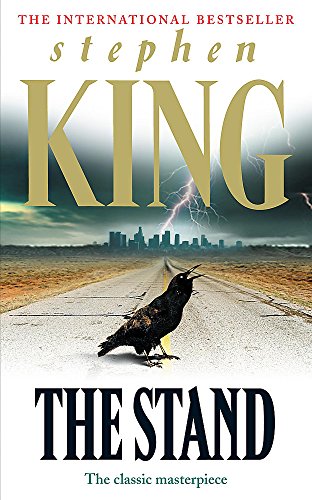
A theme in this author’s work, as much to do with a character’s individual psychology as with supernatural horror, or science-lab horror, is the ‘crossing’. Perhaps it is best exemplified in The Stand when the musician, Larry, is reflecting on the life of another musician, in the Old Time before the deadly epidemic struck. It was the familiar story of drugs, disintegration, a descent into a pit of horror – but, in this particular character’s case, it was a crossing, he came out on the other side.

The many sub-plots and characters in It involve such crossings. Of course, the accumulative horror, mystery, personal crises precipitate the crossing but the author I think is more interested – and just as skilful – in charting specifically the psychological journey of his characters.
For me, in this and other ways, Rose Madder is very possibly King’s masterpiece – just avoiding the overstretching of that abstraction of cosmic horror which is often the weakness in the otherwise masterful construction of King’s novels. In many, the fact that the desperately contrived idea is skilfully constructed, is both the marvel and the flaw – for example, in such intricate works as It and The Stand.
the horror from within
Superficially, the conceptual emphasis of a King novel can be categorized as microcosmic or macrocosmic. When cosmic horror is conceptualized from ‘without’ in the grand cosmical manner, the creaks in the system emerge. But when it is conceptualized from ‘within’ in the intimate psychological manner, the virtuosity of this great literature of the supernatural is both chilling and complete.
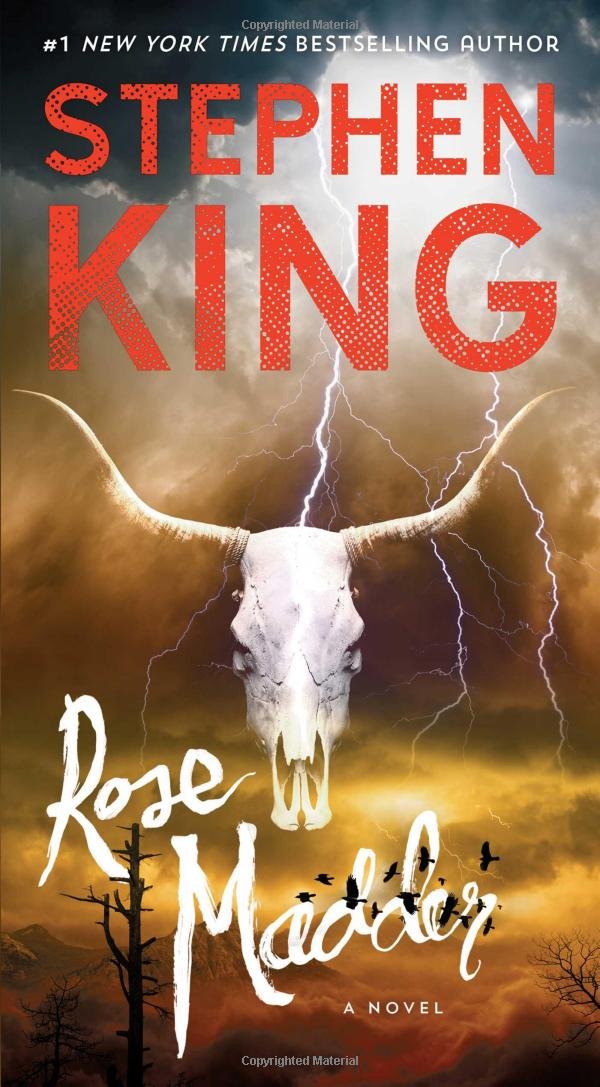
For instance, in Rose Madder, and the gradual possession of Norman Daniels, the horror that comes from ‘within’ – the ‘microcosmic’ – is wonderfully evoked through the utterly convincing quirks and swings of psychology, in particular after the grotesque murder of Thumper (Peter Slowik) – why did Norman Daniels do it – WHY? -
The answer was
there, but he turned away from it before it could do more than begin to surface
in his conscious mind, turned away because the implications were too grim to
look at. He had done Thumper for the
same reason he had strangled the redheaded whore in the fawn-coloured hotpants
– because something had crawled up from the bottom of his mind and made him
do it. The thing was there more and more
now, and he wouldn’t think of it. It was
better not to. Safer.
Rose Madder, V,7,242
Interestingly, as one who likes to see unlikely parallels, I feel that the work of Stephen King and C.S.Lewis touch, with Lewis’s character of Wither and King’s tour-de-force Daniels:
He rubbed his hand back and forth across the top of his head. The smoothness up there felt like nothing that could be a part of him; it was like touching the hood of a freshly waxed car.
'Who am I?’ he asked the empty room. ‘Who am I? Why am I here? What am I doing? Who am I?’
Rose Madder, V11,1,366
He [Wither] had passed from Hegel into Hume, thence through Pragmatism, and thence through Logical Positivism, and out at last into the complete void. The indicative mood now corresponded to no thought that his mind could entertain. He had willed with his whole heart that there should be no reality and no truth, and now even the imminence of his own ruin could not wake him . . .
That Hideous Strength, C.S.Lewis, chapter sixteen, section 1V
the joys of escape
Is it overstretching this parallel between these two writers to suggest a similar pitch in the sense of joy-in-action in both? The wonderfully free and sensual ride upon Aslan in The Lion, the Witch, and the Wardrobe has a striking parallel in Rose Madder with Rosie’s spiritually liberating ride on Bill Steiner’s motor-bike:
There were delicate fluctuations of temperature, cold as they flew through wide swales of shadow or descended into dips, warm when they passed into the sun again. At sixty miles an hour the smells came in capsules, so concentrated it was as if they were being fired out of ramjets: cows, manure, hay, earth, cut grass, fresh tar as they blipped by a driveway repaving project, oily blue exhaust as they came up behind a labouring farm truck . . .
Rose Madder, V11,3,376
The genius of Stephen King as the genius of C.S.Lewis is the ability to describe the ordinary just as extraordinarily as the supernatural. And the voice of God in Desperation is as convincing in the literary staging, as any such voice in Lewis’s works. Another parallel is the way the ordinary and the supernatural merge to form a sort of slanting boundary in perception. Stephen King and C.S.Lewis are masters of this challenge: hence the role of the ATM card in the whole spiritual dimension of Rose Madder. Hence the role of the fragment of the broken lamp-post in Lewis’s The Magician’s Nephew.
the fount of evil
Rose Madder is the successful microcosmic, rather than the flawed macrocosmic, in Stephen King’s works, because of the author’s fixation on Norman Daniels:
“His headache was getting worse, and the bright little zigzags had started to show around the edges of things again . . .”
Rose Madder, V11,8,404
It is significant that when Rosie escapes into a completely new and alien dimension, the author fails – in a venture and context very similar to the alien dimension in David Lindsay’s The Haunted Woman – because Stephen King has no gift for writing about wholly other worlds.
In King, perhaps more than any writer who has tried to evoke the supernatural, is the ready and pulp poetry of awareness, such as Norman Daniels’s fragmented awareness of the voices of the women in the picnic-toilets:
Every time the one doing most of the talking paused for breath the other one would giggle, a sound so jagged it made Norman feel as it someone were rolling his brain in broken glass the way a baker would roll a doughnut in sugar . . .
Rose Madder, V11,11,413
converging plot-streams
Rarely among the endings of Stephen King’s works, that of Rose Madder has a roundedly satisfying, and philosophically plausible, universality – all the threads of Nemesis and Female Mystery and Suffering and First Cause of Nature being successfully tied up, instead of the author juggling such ambitious themes, the juggling ending with a brilliantly staged but frustrated consummation.
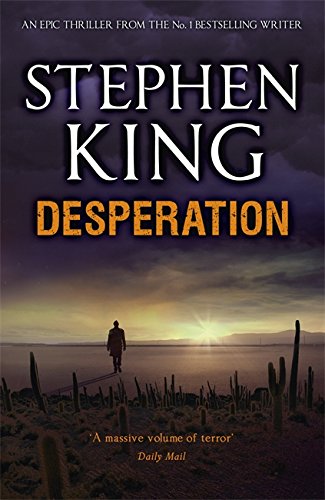
The skill of a writer is not always commensurate with the organization of metaphysics! – and why should it be? But Stephen King sets himself the challenge. Mostly he fails in the organization (and succeeds with the skill) but indeed part of the fascination with King is the qualifying parenthesis, and the enormity of the unfulfilled challenge.
In Rose Madder the challenge is fulfilled and the skill as always never flags. The voice – “Practical-Sensible” – ever and again raises its clamour – but the entire and bursting exhileration and sweetness of Rosie’s escape from Hell is too strong for reining in and here we have an extraordinary aspect of a writer of horror: his ability to convey happiness, bliss, freshness, vividly and feelingly and exploratively. Of course this is a way of making the horror seem all the more horrifying; the impact greater. But it is not a mere foil or technique. The author looks at the antithesis of the horrors as an autonomous, overriding value of the cosmos that filters through – and sometimes blasts through – everyday human experience. The “blasting” technique is used with finely judged audacity in the novel Desperation.
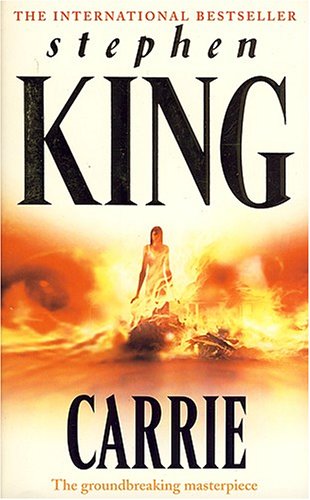
A note on the extraordinary Carrie to end with - a great novel, of the misfit, of both the outsider and the conformist – of self-discovery, self-examination (brilliantly charted in the characterization of Susan Snell); fanaticism and the lonely follow-through to evil. The High School background is lovingly evoked, the politics and the smells and the whole imperative anatomy of bullying and the troubled decency of those who are popular and look helplessly upon the cut-throat arena. Sue’s and Tommy’s decision to present Carrie White to the Prom prefigures many of the redemptive rites-of-passage in Stephen King’s works which, enmeshed, and sometimes in harmony with, the supernatural, form one of the essential themes of a fallen humanity, in which cruelty and corruption vie with renewal and redemption. It is as though at the point of consummation, the brink of revelation, of these human emotional tides, the supernatural forces are fully unleashed, and as though there is a stage when the lever of the dam is released. Many of the themes and techniques of the author are begun in this novel, sometimes to be bettered later, and sometimes not.
>> Authors































